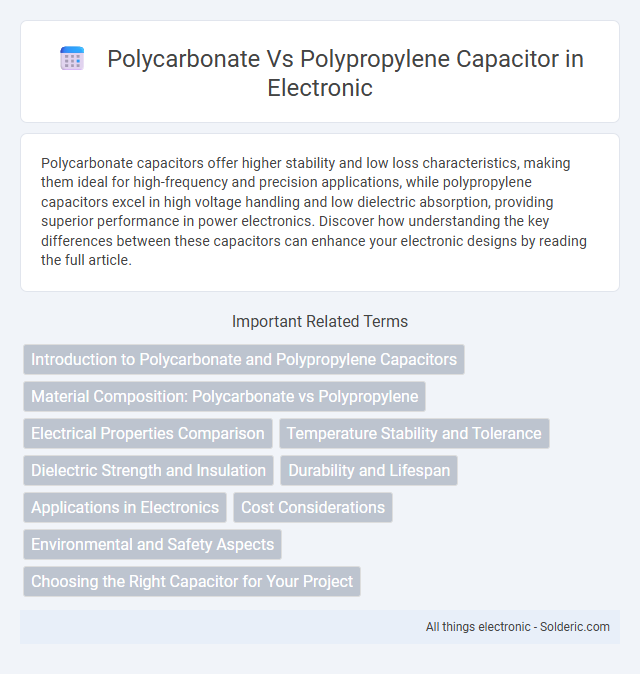Polycarbonate capacitors offer higher stability and low loss characteristics, making them ideal for high-frequency and precision applications, while polypropylene capacitors excel in high voltage handling and low dielectric absorption, providing superior performance in power electronics. Discover how understanding the key differences between these capacitors can enhance your electronic designs by reading the full article.
Comparison Table
| Feature | Polycarbonate Capacitor | Polypropylene Capacitor |
|---|---|---|
| Dielectric Material | Polycarbonate (PC) | Polypropylene (PP) |
| Capacitance Stability | Good stability over temperature | Excellent stability, minimal change |
| Temperature Range | -55degC to +125degC | -55degC to +105degC |
| Dielectric Loss (tan d) | Low to moderate | Very low (high Q factor) |
| Insulation Resistance | High | Very High |
| Voltage Rating | Up to 630 V | Up to 1000 V or higher |
| Size and Form Factor | Medium size | Larger than PC for same capacitance |
| Applications | Audio circuits, timing, filtering | High frequency filters, precision circuits |
| Moisture Sensitivity | Moderate, requires protection | Low, good moisture resistance |
| Cost | Higher than polypropylene | Generally lower cost |
Introduction to Polycarbonate and Polypropylene Capacitors
Polycarbonate capacitors offer high stability and excellent electrical properties, making them ideal for precision applications and environments requiring reliable performance under varying temperatures. Polypropylene capacitors provide superior low dissipation factor and high dielectric strength, ensuring minimal signal loss and long-term durability in audio and high-frequency circuits. Understanding the distinct benefits of these capacitor types helps you select the right component for your electronic design needs.
Material Composition: Polycarbonate vs Polypropylene
Polycarbonate capacitors use a polymer made from bisphenol A and phosgene, resulting in high dielectric constant and thermal stability, making them suitable for precision applications. Polypropylene capacitors are composed of a crystalline polymer with excellent electrical insulating properties and low dielectric loss, ideal for high-frequency and audio circuits. Understanding the material composition helps you choose the right capacitor based on performance needs like stability, temperature tolerance, and signal integrity.
Electrical Properties Comparison
Polycarbonate capacitors exhibit low dielectric absorption, high insulation resistance, and stable capacitance over a wide temperature range, making them ideal for precision applications. Polypropylene capacitors offer excellent dielectric strength, low dissipation factor, and superior self-healing properties, resulting in high reliability under high-frequency and high-voltage conditions. Both materials provide low leakage currents, but polypropylene capacitors generally outperform polycarbonate in high-frequency filtering and pulse applications due to their lower dielectric losses.
Temperature Stability and Tolerance
Polycarbonate capacitors offer excellent temperature stability, maintaining consistent performance across a wide temperature range typically from -55degC to +125degC, with tight tolerance levels often within +-5%. Polypropylene capacitors provide superior temperature stability compared to many other types, with operating temperatures usually between -55degC and +105degC, and tolerances as low as +-1%. Your choice between polycarbonate and polypropylene capacitors should consider polycarbonate for higher temperature applications, while polypropylene excels in precision tolerance and lower dielectric losses.
Dielectric Strength and Insulation
Polycarbonate capacitors exhibit higher dielectric strength, typically around 280-300 kV/mm, providing superior insulation properties crucial for high-voltage applications. Polypropylene capacitors, while slightly lower in dielectric strength at approximately 150-220 kV/mm, offer excellent insulation with low dissipation factors and high insulation resistance, making them ideal for precision filtering and audio circuits. The choice between polycarbonate and polypropylene capacitors depends on the specific insulation requirements and voltage levels of the application.
Durability and Lifespan
Polycarbonate capacitors exhibit superior durability due to their robust construction and stability under high-temperature conditions, resulting in longer operational lifespans compared to polypropylene capacitors. Polypropylene capacitors generally offer lower insulation resistance and may degrade faster when exposed to moisture or electrical stress, reducing their overall lifespan. Choosing polycarbonate capacitors can enhance the reliability and longevity of your electronic circuits in demanding environments.
Applications in Electronics
Polycarbonate capacitors excel in high-frequency and precision electronic circuits due to their low dielectric loss and excellent stability under varying temperatures. Polypropylene capacitors are widely used in power electronics, audio equipment, and motor run applications because of their high insulation resistance and ability to handle high current pulses. Both capacitor types are essential for filtering, timing, and coupling in electronics, with polycarbonate favored for signal fidelity and polypropylene for robustness in electrical noise environments.
Cost Considerations
Polypropylene capacitors generally offer a lower cost option compared to polycarbonate capacitors due to simpler manufacturing processes and widespread availability of polypropylene film. Polycarbonate capacitors, while more expensive, provide higher dielectric strength and better temperature stability, justifying their premium price in precision applications. Cost considerations must balance initial investment with performance requirements and longevity in specific electronic circuits.
Environmental and Safety Aspects
Polycarbonate capacitors offer superior thermal stability and lower toxicity, making them safer for use in environments requiring strict environmental compliance and reducing hazardous waste during disposal. Polypropylene capacitors, while generally less expensive, have higher flammability and release harmful gases when burnt, posing greater environmental and safety risks. Selecting polycarbonate capacitors minimizes environmental impact and enhances workplace safety due to their eco-friendly materials and enhanced chemical resistance.
Choosing the Right Capacitor for Your Project
Polycarbonate capacitors offer high stability and low dielectric loss, making them ideal for precision filtering and timing circuits, while polypropylene capacitors provide excellent insulation resistance and low moisture absorption, suited for high-frequency and power applications. Your project's specific requirements for temperature tolerance, capacitance accuracy, and environmental conditions will determine the best capacitor type. Evaluating these characteristics ensures optimal performance and longevity in electronic designs.
Polycarbonate vs Polypropylene Capacitor Infographic

 solderic.com
solderic.com